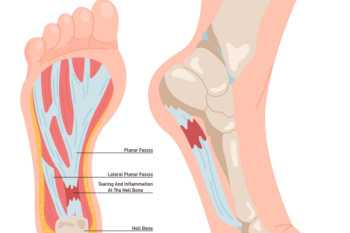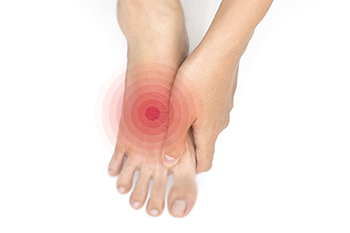Connect With Us
Blog
Items filtered by date: March 2025
Common Injuries That Affect the Achilles Tendon

The Achilles tendon is the largest tendon in the body and is essential for walking, running, and jumping. Unfortunately, it is also prone to several common injuries. Achilles tendinitis occurs when the tendon becomes inflamed from overuse or repetitive stress, often causing pain and stiffness at the back of the ankle. Another injury is Achilles tendinosis, which involves degeneration and thickening of the tendon over time. More serious injuries include partial tears or a complete rupture of the tendon, which can happen suddenly during sports or physical activity. Symptoms of Achilles injuries include pain, swelling, tenderness, and difficulty walking. Ignoring early warning signs can lead to more serious problems. If you are experiencing Achilles tendon pain, it is suggested that you see a podiatrist for a proper diagnosis and appropriate treatment.
Achilles tendon injuries need immediate attention to avoid future complications. If you have any concerns, contact Josef Elouze, DPM of Elite Podiatry. Our doctor can provide the care you need to keep you pain-free and on your feet.
What Is the Achilles Tendon?
The Achilles tendon is a tendon that connects the lower leg muscles and calf to the heel of the foot. It is the strongest tendon in the human body and is essential for making movement possible. Because this tendon is such an integral part of the body, any injuries to it can create immense difficulties and should immediately be presented to a doctor.
What Are the Symptoms of an Achilles Tendon Injury?
There are various types of injuries that can affect the Achilles tendon. The two most common injuries are Achilles tendinitis and ruptures of the tendon.
Achilles Tendinitis Symptoms
- Inflammation
- Dull to severe pain
- Increased blood flow to the tendon
- Thickening of the tendon
Rupture Symptoms
- Extreme pain and swelling in the foot
- Total immobility
Treatment and Prevention
Achilles tendon injuries are diagnosed by a thorough physical evaluation, which can include an MRI. Treatment involves rest, physical therapy, and in some cases, surgery. However, various preventative measures can be taken to avoid these injuries, such as:
- Thorough stretching of the tendon before and after exercise
- Strengthening exercises like calf raises, squats, leg curls, leg extensions, leg raises, lunges, and leg presses
If you have any questions please feel free to contact our office located in (Holiday City) Toms River, NJ . We offer the newest diagnostic tools and technology to treat your foot and ankle needs.
Plantar Fasciitis Facts

Plantar fasciitis occurs when the thick band of tissue along the bottom of the foot becomes inflamed. This tissue, known as the plantar fascia, supports the arch and absorbs shock during movement. Symptoms include sharp heel pain, especially in the morning or after long periods of rest, as well as stiffness and tenderness along the arch. The condition may persist if the underlying causes are not addressed. Continued strain from improper footwear, excessive standing, or high-impact activities can delay healing. Tight calf muscles and poor foot mechanics may also contribute to prolonged discomfort. Without proper treatment, including stretching, supportive footwear, and rest, plantar fasciitis can become chronic, affecting mobility and quality of life. If you have heel pain, it is strongly suggested that you consult a podiatrist who can diagnose the cause, and ensure an appropriate care plan for relief.
Plantar fasciitis is a common foot condition that is often caused by a strain injury. If you are experiencing heel pain or symptoms of plantar fasciitis, contact Josef Elouze, DPM from Elite Podiatry. Our doctor can provide the care you need to keep you pain-free and on your feet.
What Is Plantar Fasciitis?
Plantar fasciitis is one of the most common causes of heel pain. The plantar fascia is a ligament that connects your heel to the front of your foot. When this ligament becomes inflamed, plantar fasciitis is the result. If you have plantar fasciitis you will have a stabbing pain that usually occurs with your first steps in the morning. As the day progresses and you walk around more, this pain will start to disappear, but it will return after long periods of standing or sitting.
What Causes Plantar Fasciitis?
- Excessive running
- Having high arches in your feet
- Other foot issues such as flat feet
- Pregnancy (due to the sudden weight gain)
- Being on your feet very often
There are some risk factors that may make you more likely to develop plantar fasciitis compared to others. The condition most commonly affects adults between the ages of 40 and 60. It also tends to affect people who are obese because the extra pounds result in extra stress being placed on the plantar fascia.
Prevention
- Take good care of your feet – Wear shoes that have good arch support and heel cushioning.
- Maintain a healthy weight
- If you are a runner, alternate running with other sports that won’t cause heel pain
There are a variety of treatment options available for plantar fasciitis along with the pain that accompanies it. Additionally, physical therapy is a very important component in the treatment process. It is important that you meet with your podiatrist to determine which treatment option is best for you.
If you have any questions, please feel free to contact our office located in (Holiday City) Toms River, NJ . We offer the newest diagnostic and treatment technologies for all your foot care needs.
Are You Suffering From Nerve Damage?
Diabetic Neuropathy Foot Issues

Foot neuropathy is a common complication for those with high blood glucose levels, often linked to diabetes. High blood sugar can damage the nerves in your feet, leading to symptoms like tingling, numbness, burning sensations, or sharp pains. Some people may also experience weakness or loss of feeling, making it difficult to notice injuries or infections. Over time, this damage can worsen, potentially leading to balance problems or ulcers that may go unnoticed. A podiatrist can diagnose foot neuropathy through a physical examination and sensory testing. Treatment includes custom insoles to relieve pressure, medication to manage pain, or targeted exercises to improve mobility and strength. In some cases, they may recommend lifestyle changes to help control blood sugar levels. Proper foot care is critical to prevent further complications, as untreated neuropathy can lead to more severe issues. If you have foot neuropathy, it is suggested that you schedule an appointment with a podiatrist for expert care and guidance.
Neuropathy
Neuropathy can be a potentially serious condition, especially if it is left undiagnosed. If you have any concerns that you may be experiencing nerve loss in your feet, consult with Josef Elouze, DPM from Elite Podiatry. Our doctor will assess your condition and provide you with quality foot and ankle treatment for neuropathy.
What Is Neuropathy?
Neuropathy is a condition that leads to damage to the nerves in the body. Peripheral neuropathy, or neuropathy that affects your peripheral nervous system, usually occurs in the feet. Neuropathy can be triggered by a number of different causes. Such causes include diabetes, infections, cancers, disorders, and toxic substances.
Symptoms of Neuropathy Include:
- Numbness
- Sensation loss
- Prickling and tingling sensations
- Throbbing, freezing, burning pains
- Muscle weakness
Those with diabetes are at serious risk due to being unable to feel an ulcer on their feet. Diabetics usually also suffer from poor blood circulation. This can lead to the wound not healing, infections occurring, and the limb may have to be amputated.
Treatment
To treat neuropathy in the foot, podiatrists will first diagnose the cause of the neuropathy. Figuring out the underlying cause of the neuropathy will allow the podiatrist to prescribe the best treatment, whether it be caused by diabetes, toxic substance exposure, infection, etc. If the nerve has not died, then it’s possible that sensation may be able to return to the foot.
Pain medication may be issued for pain. Electrical nerve stimulation can be used to stimulate nerves. If the neuropathy is caused from pressure on the nerves, then surgery may be necessary.
If you have any questions, please feel free to contact our office located in (Holiday City) Toms River, NJ . We offer the newest diagnostic and treatment technologies for all your foot care needs.
The Essential Responsibilities of a Podiatrist

A podiatrist plays a vital role in diagnosing and treating a variety of foot and ankle conditions. They assess patients to determine the underlying causes of pain, deformities, or mobility issues. Treatment plans may include medication or lifestyle modifications. In more severe cases, podiatrists perform surgical procedures to correct structural abnormalities, repair injuries, or alleviate chronic pain. They are also responsible for prescribing medications to manage infections, inflammation, or other foot-related ailments. Additionally, podiatrists design and create custom orthotics to provide support and improve foot function. By addressing both acute and chronic conditions, podiatrists play a vital role in enhancing the overall health and well-being of individuals with foot and ankle concerns. If you are experiencing any type of foot or ankle pain, it is suggested that you consult a podiatrist who can accurately diagnose and treat various foot conditions.
If you are experiencing pain in the feet or ankles, don’t join the stubborn majority refusing treatment. Feel free to contact Josef Elouze, DPM from Elite Podiatry. Our doctor can provide the care you need to keep you pain-free and on your feet.
What Is a Podiatrist?
Someone would seek the care of a podiatrist if they have suffered a foot injury or have common foot ailments such as heal spurs, bunions, arch problems, deformities, ingrown toenails, corns, foot and ankle problems, etc.
Podiatric Treatment
A podiatrist will treat the problematic areas of the feet, ankle or lower leg by prescribing the following:
- Physical therapy
- Drugs
- Orthotic inserts or soles
- Surgery on lower extremity fractures
A common podiatric procedure a podiatrist will use is a scanner or force plate which will allow the podiatrist to know the designs of orthotics. Patients are then told to follow a series of tasks to complete the treatment. The computer will scan the foot a see which areas show weight distribution and pressure points. The podiatrist will read the analysis and then determine which treatment plans are available.
If you have any questions please feel free to contact our office located in (Holiday City) Toms River, NJ . We offer the newest diagnostic and treatment technologies for all your foot and ankle needs.


